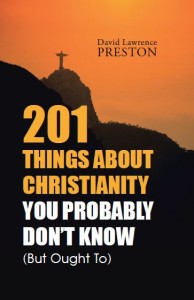The first and most obvious historical fact about the main character of the New Testament gospels is that he wasn’t called ‘Jesus’. To some, this is an obvious point, to others it comes as a surprise; some acknowledge it but think it doesn’t matter. But it does, because it illustrates the way in which the religiously-charged carpenter from Nazareth was transformed into the son of G_d in the minds of his followers.
He was probably known to his family and friends by the Aramaic name Yeshua bar Yehosef – Yeshua Son of Joseph (or Yeshua ben Josef in Hebrew). Aramaic was a dialect of Hebrew once spoken in Northern Palestine, and Yeshua’s mother tongue. Jesus is the Greek equivalent.
So why Greek?
All the books of the New Testament were originally written in Greek, not Hebrew or Latin as commonly supposed. Then around 382 CE, a priest called Jerome was translating the New Testament scripts into Latin and decided to stay with the Greek name. It stuck.
After his death, Yeshua became known as ‘the Christ’ at the instigation of his leading apostle, Paul of Tarsus. The literal meaning of Christ is ‘the anointed one’, from the Greek ‘Christos’. ‘Messiah’ means much the same thing.
Yeshua became known to the world as ‘Jesus Christ’, but he would not have answered to either name. Strange, isn’t it? Millions of subscribers to the world’s largest and most influential religion refer to their ‘Saviour’ by a name he would not have recognised! They are names ascribed to him years after his death.
Does it matter? Consider this: the bogus and mischievous millionaire ‘guru’ known as Bagwan Shree Rajneesh in his lifetime, the man who preached simplicity and humility yet acquired 98 Rolls Royces, was relaunched as ‘Osho’ after his death. It distanced him from the real man and made him seem more likely to be taken seriously. Need I say more?
Copyright David Lawrence Preston, 26.8.2016
Follow me on Facebook and Twitter @David_L_Preston
Balboa Press, 2015



